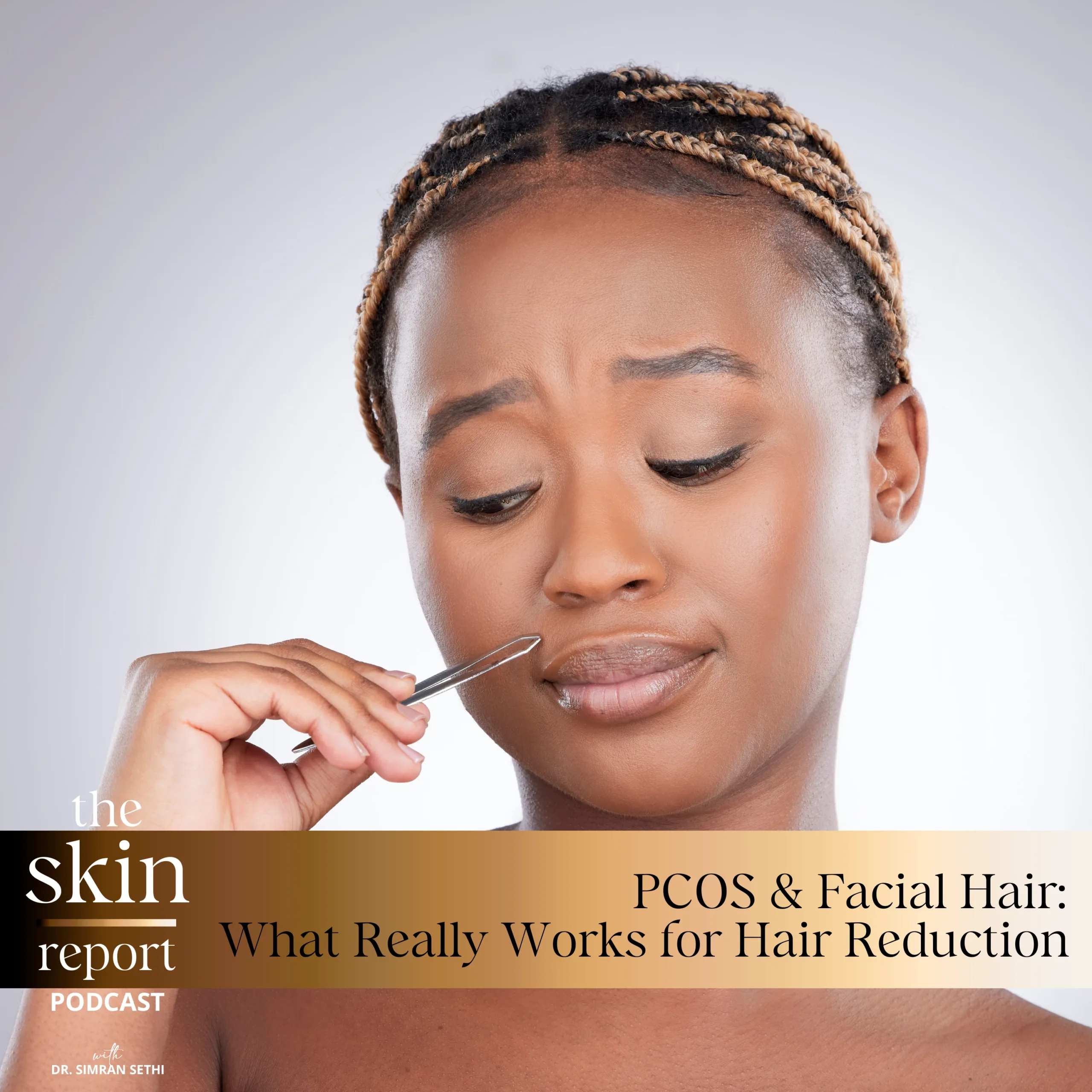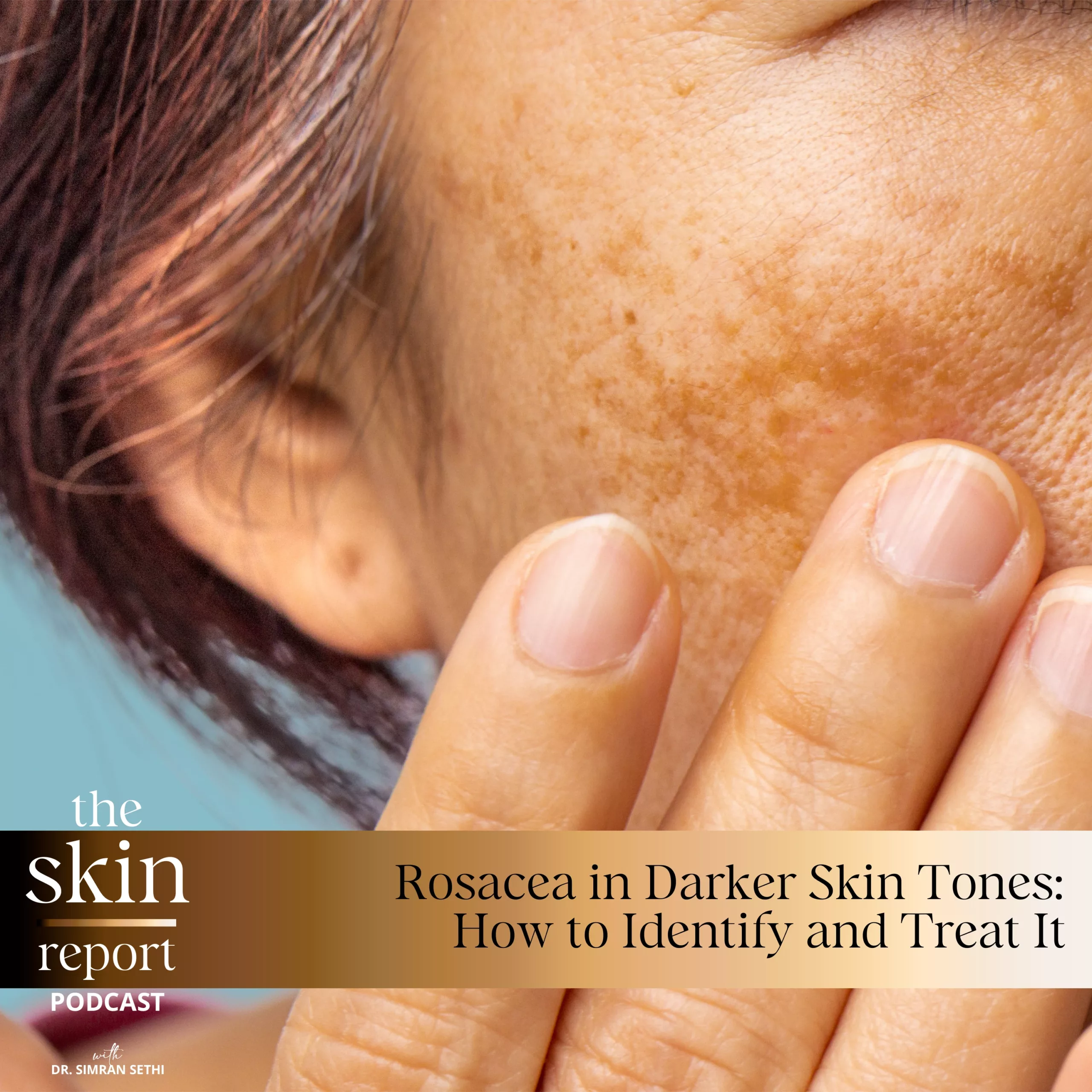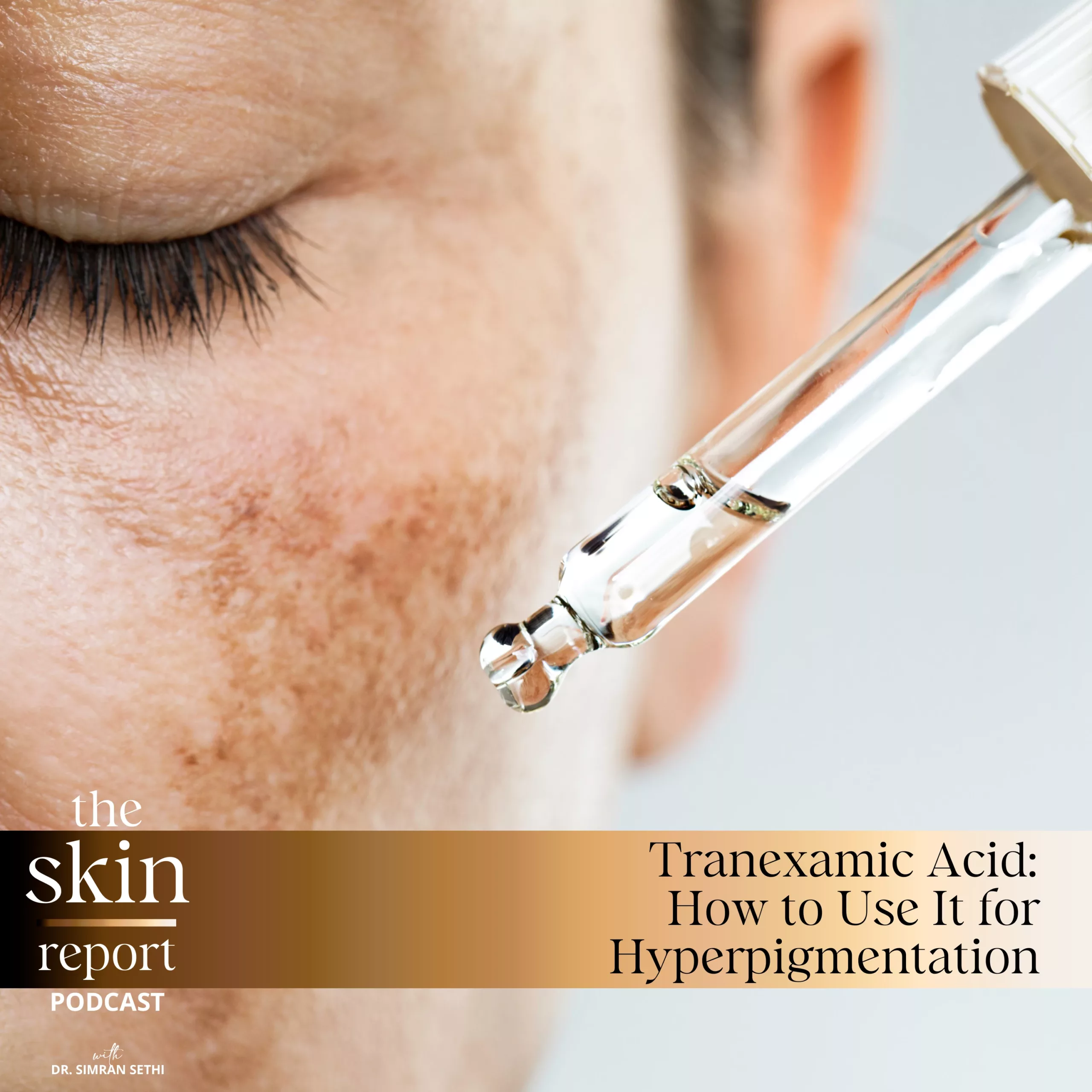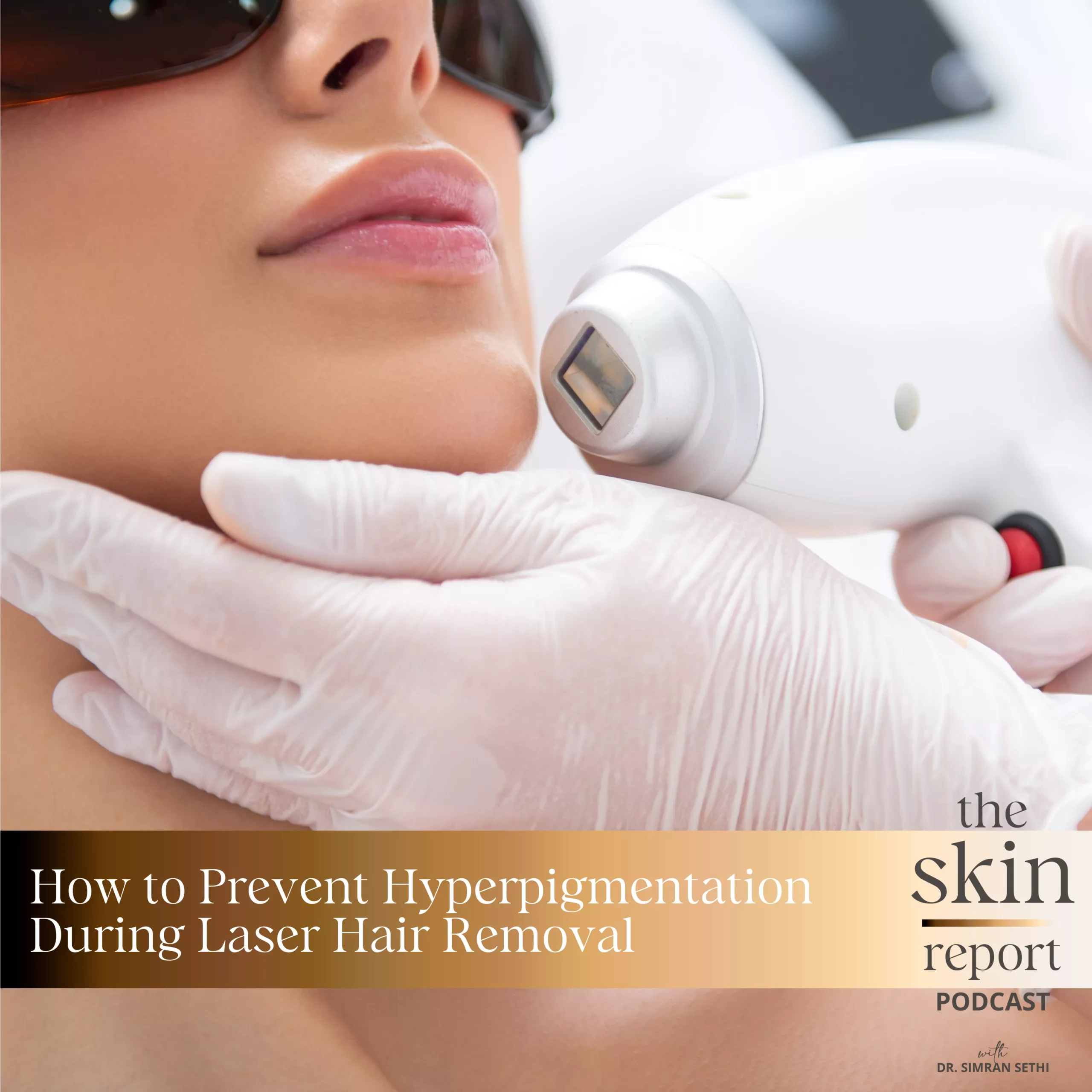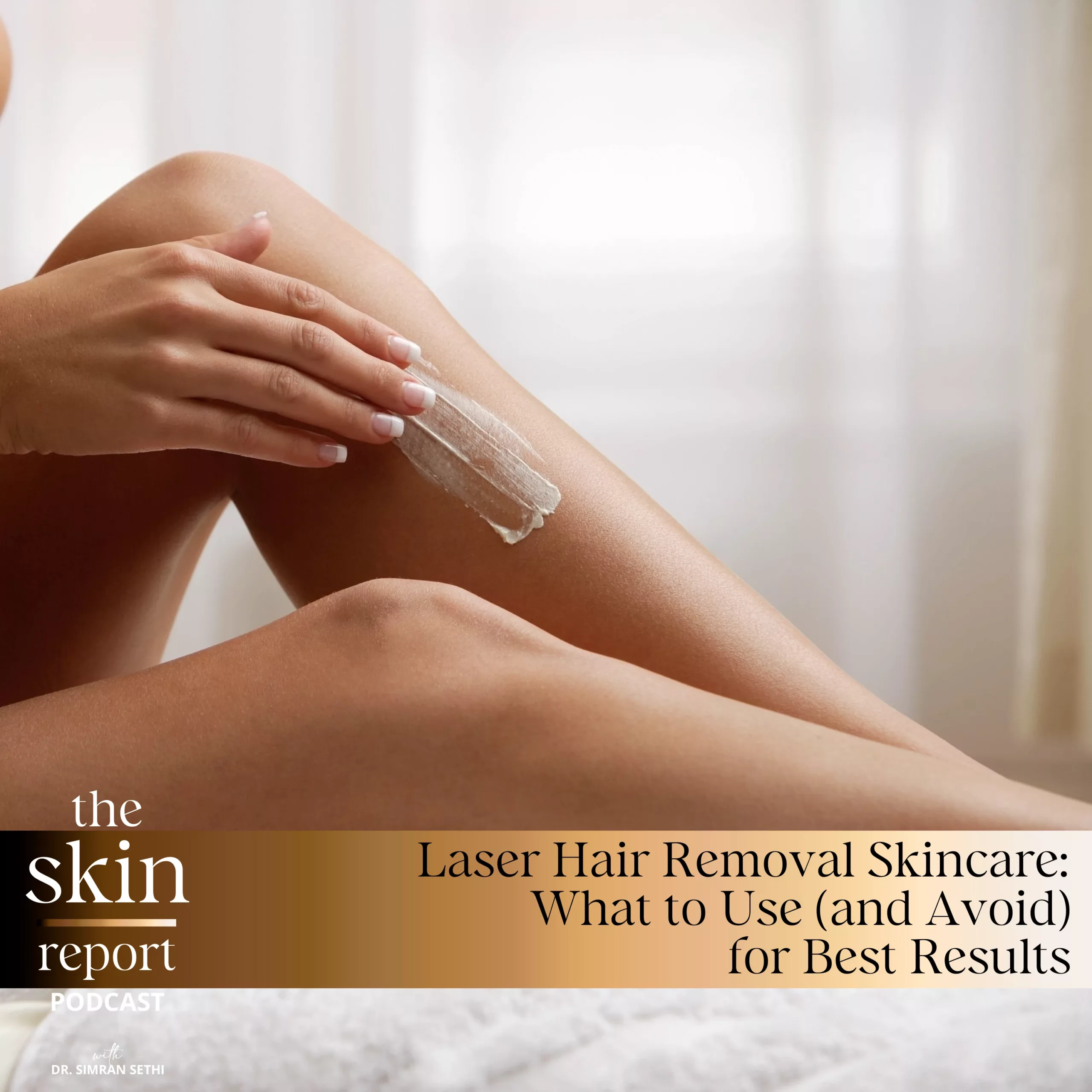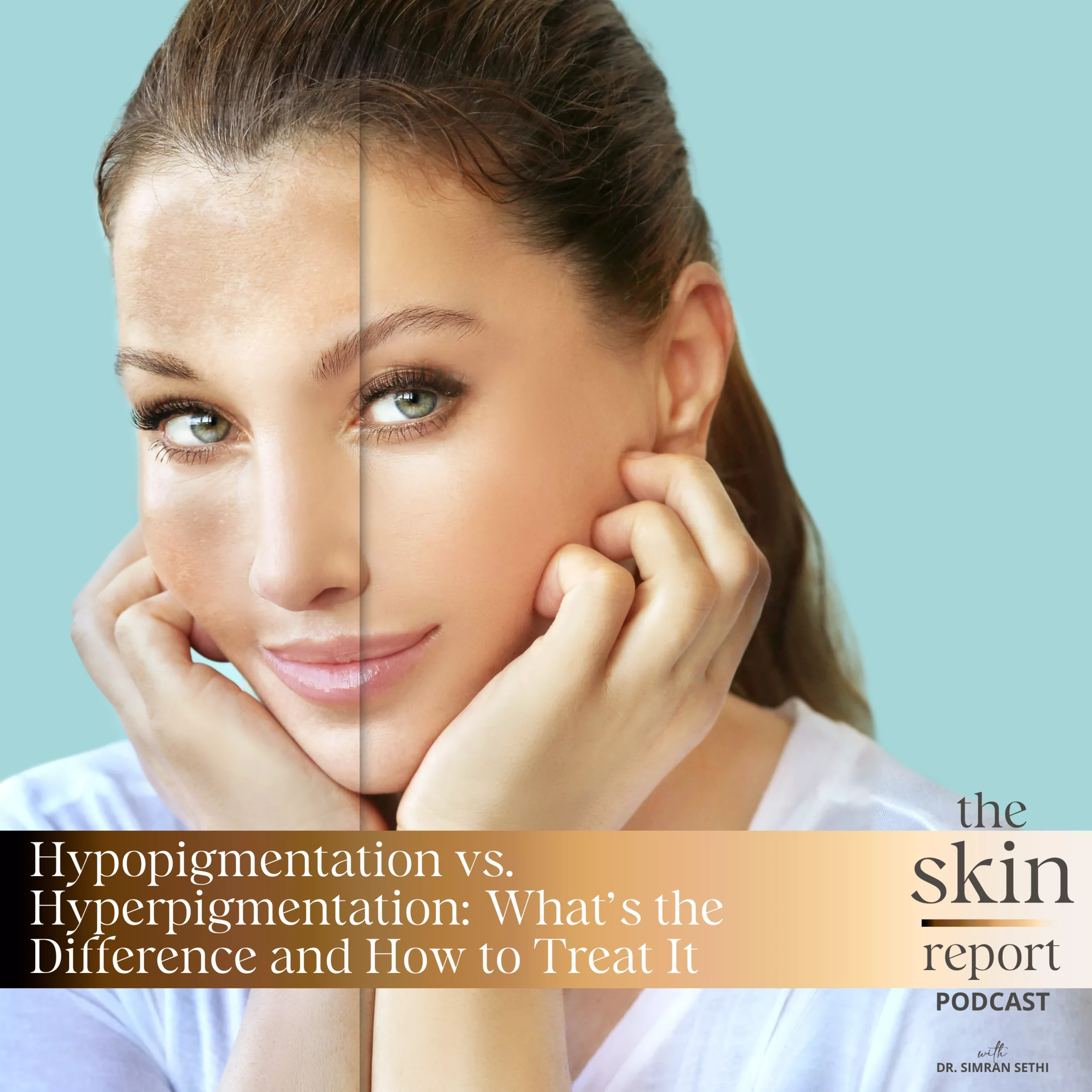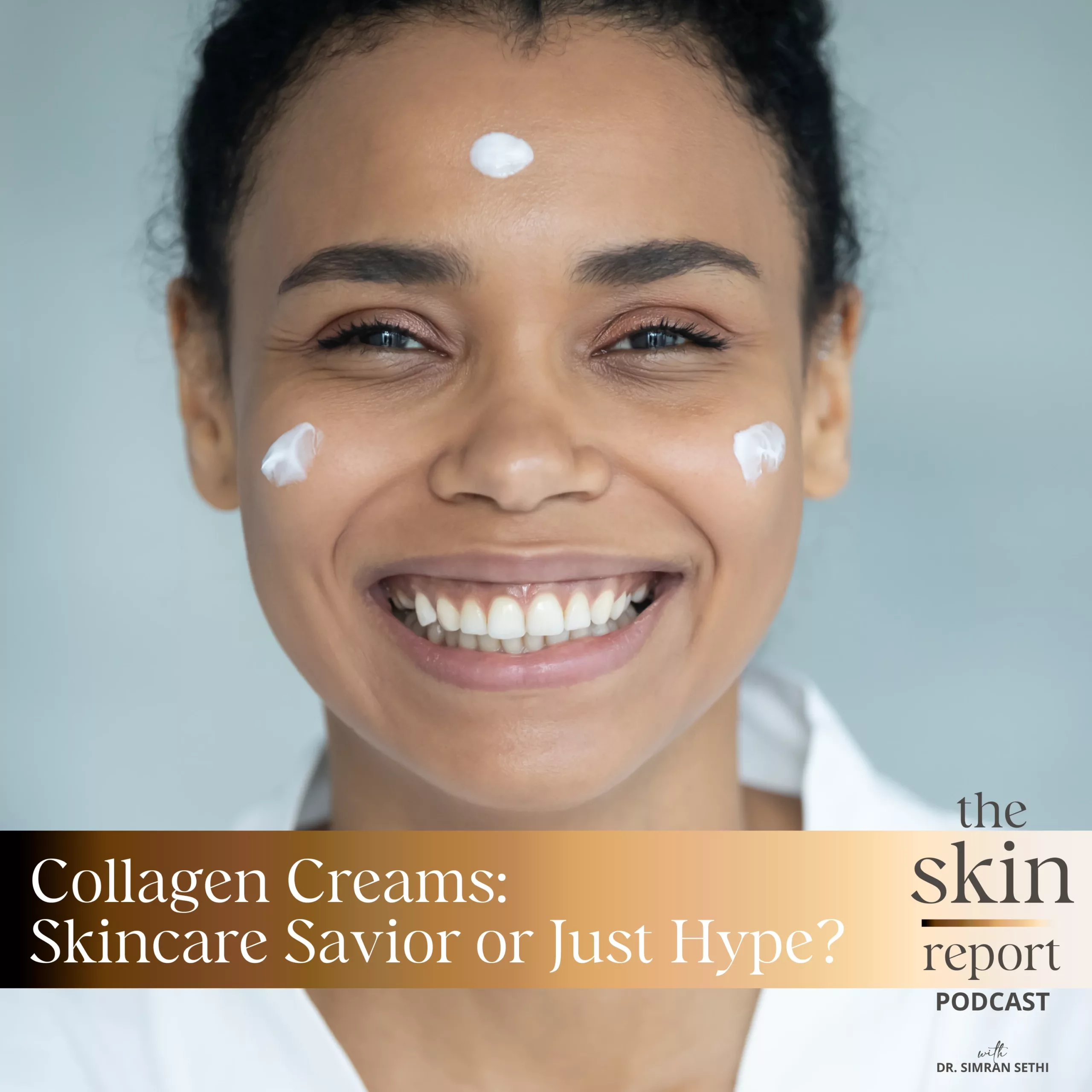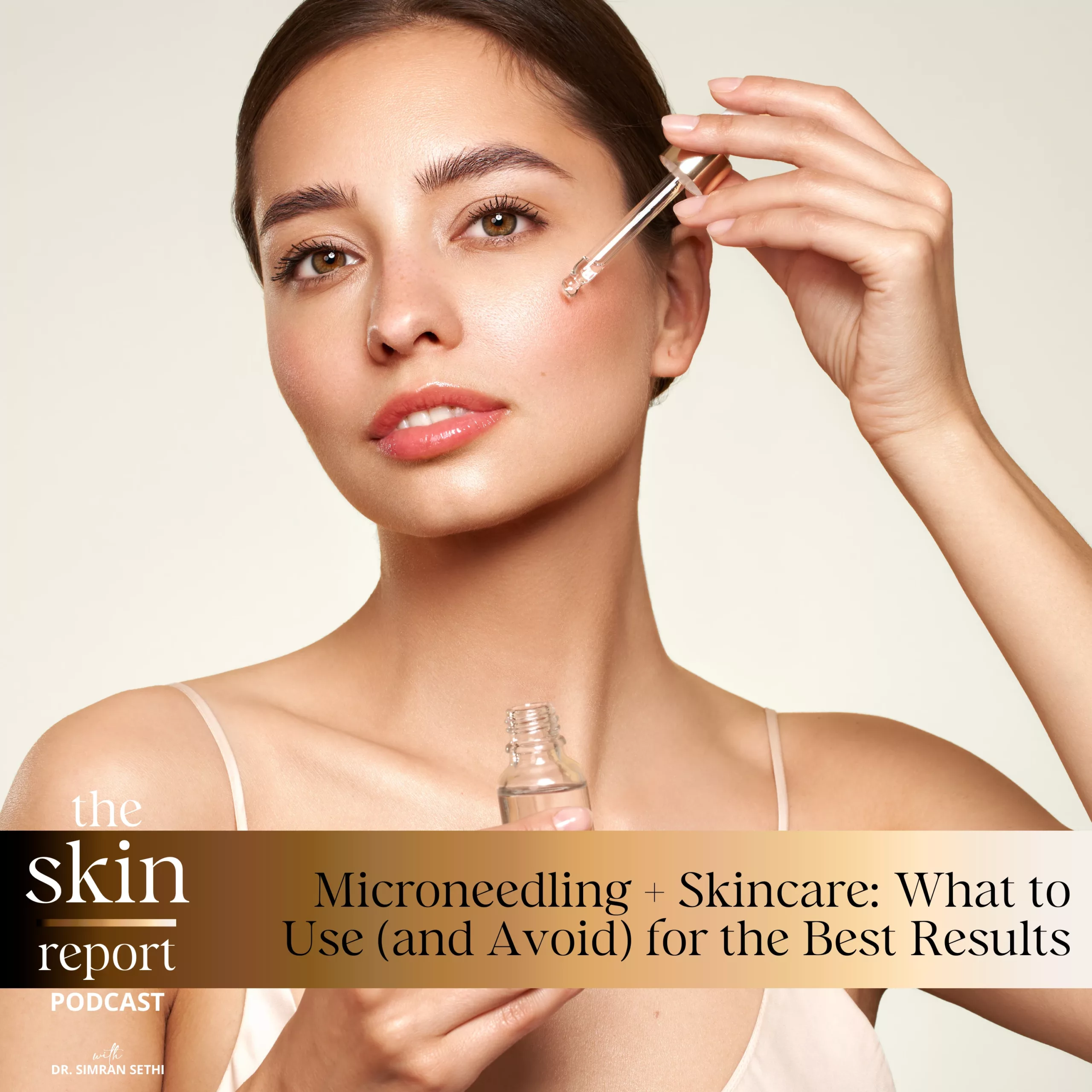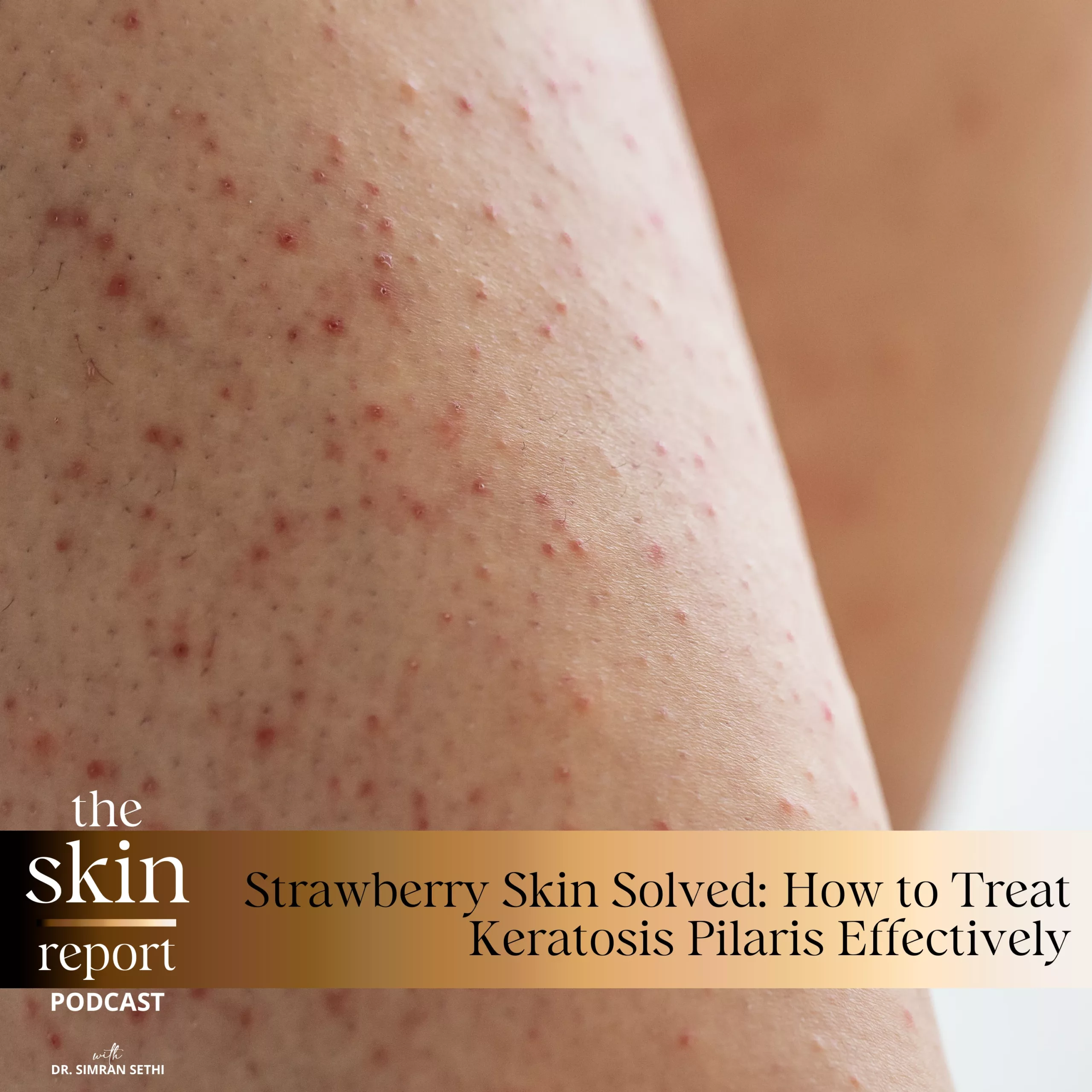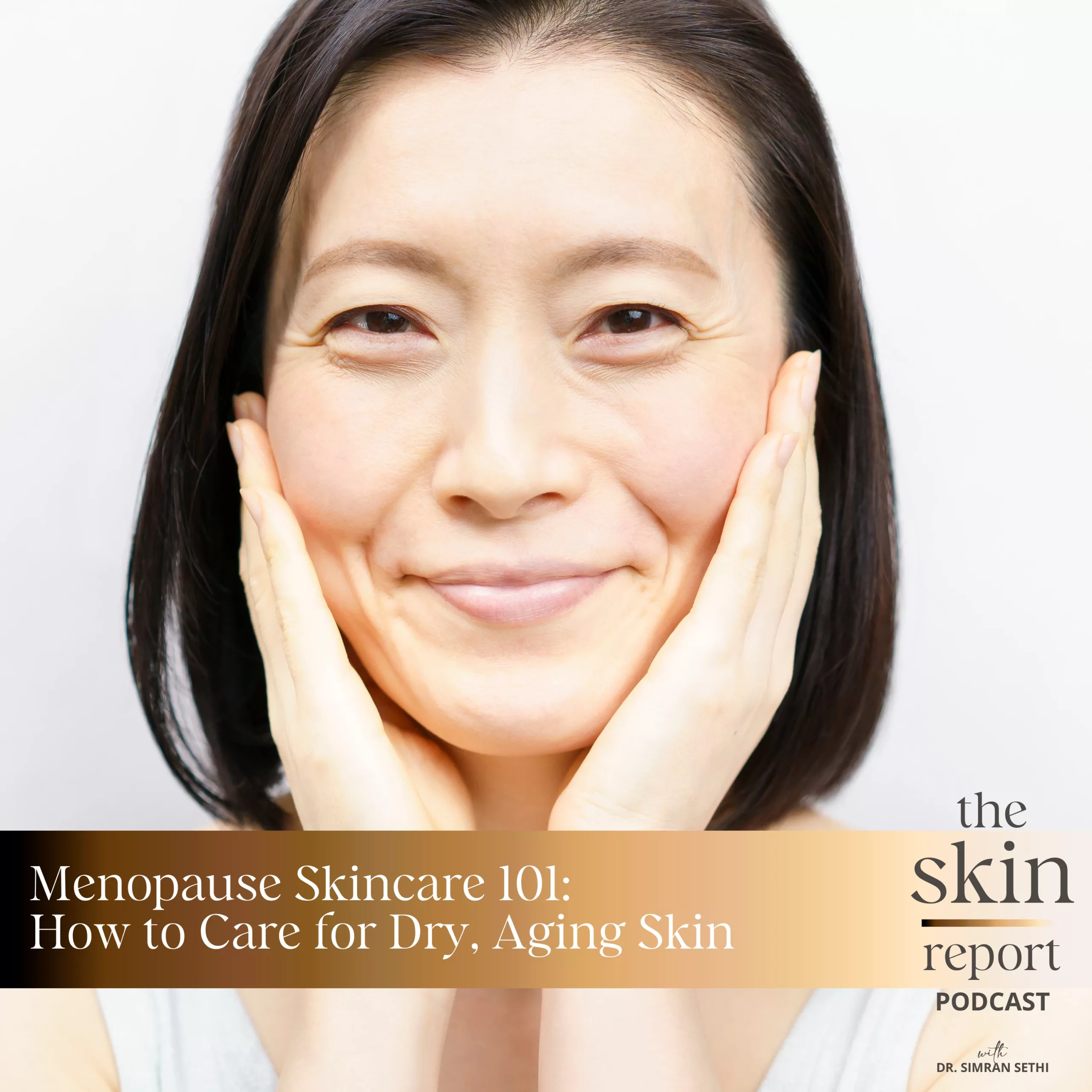Summer Skin Cleansing
With the warm weather’s arrival, now is an excellent time to consider your cleansing routine. Summer can bring humidity, sunscreen, and sweat, leading to clogged pores. Therefore, perfecting our cleansing with the right cleansers, habits, and products can help us keep our skin clear. Meanwhile, making smart lifestyle changes can help us avoid breakouts and bacteria to keep our skin happy and beautiful all summer long!
The Skin Report is a podcast created to educate listeners on methods to improve skin health for people of all ethnicities and ages. On this episode, host Dr. Sethi discusses Skin cleansing habits, products, and misinformation to consider as you curate your summer skincare routine. She covers topics like double cleansing, oil cleansers, and facial cleansing tools. She also sheds light on how additional lifestyle factors can influence your accumulation of skin bacteria and how you can adjust your habits for healthier, happier skin.
Follow and DM a question for Dr. Sethi to answer on The Skin Report Podcast:
Renew Beauty Instagram:
https://www.instagram.com/renewmd_beauty/
RenewMD Beauty Medical Spas, California:
https://renewmdwellness.com/
The Skin Report Season 1 Episode 5: Determining Skin Type:
https://theskinreportbydrsethi.com/s1e5-determining-skin-type/
Skin Cycling Duo Special Offer 20% off Promo Code: SKINREPORT20
This transcript was exported on May 2, 2023 -view latest version here.
Skincare can sometimes feel overwhelming. Whether it’s finding the right products, ingredients, or treatments, there’s a lot out there, but not always for people of African, Hispanic, Middle Eastern and Eastern South Asian descent. That’s why I set out to educate myself and others so that we can all feel beautiful in our skin. Hello and welcome back to The Skin Report. I’m Dr. Simran Sethi, an internal medicine doctor, mom of three, and CEO and founder of Renew MD Medical Spas and Skin by Dr. Sethi.
As we swing into summer with its warmer weather and greater humidity, we want to keep our skin as clean and fresh as possible. With sunscreen and sweating, our pores are more likely to clog, so now is the perfect time to perfect our cleansing routine. Today we’ll tackle cleansing trends and habits from double cleansing, Clarisonic face brushes, and more.
Cleansing our skin is the first and most foundational step in any routine, and while it’s the basic skincare step, it isn’t as basic as it may seem. There are many habits, products, and misinformation out there. We discussed in episode five of season one how to determine your skin tone and type to help identify the best products for your skin, such as cleansers. You can check out the link to that episode in the show notes below.
Now, before we delve into deep cleaning, I want to discuss the purpose of cleaning our skin. While it may seem silly, many people don’t take cleansing that seriously and they should, even if they don’t have acne. And why is this? If you have clear skin, why clean it twice a day?
Even those of us without acne still make new skin every day. Cleaning our skin removes dirt, debris and dead skin cells from its surface. So just like washing our body, washing our face will help to rid it of pollutants, microbes from the environment, and old skin cells.
Another reason to clean our skin is so that our skincare products can be more effective. Our skin’s job is to protect the body from bacteria and environmental insults, but collection of too much debris on the skin surface will interfere with important active ingredients in your skincare from getting to the skin’s deeper layers where they are needed. To increase the effectiveness of our products, which we spend our hard-earned money on, we will want to start with a clean canvas.
Now let’s get into the trends. You may have seen recently on Instagram, TikTok and YouTube the trend of double cleansing either with the same product or another product twice. I feel that double cleansing is not needed unless you are washing off makeup or have very oily skin. Intuitively, you would think that double cleansing will just make your skin and pores cleaner, but it runs a risk of overdrawing your skin. Some may think that you can prevent drying out the skin by using an oil cleanser after the foaming cleanser, but again, I feel that this is a wasted step. Why not just use a cleanser that has poor cleansing along with additional hydrating ingredients? My line’s resurfacing face and body cleanser is an example of just that.It’s a salicylic acid cleanser that effectively deep cleans pores, but also contains extra virgin coconut oil, which prevents it from drying the skin out. I use it daily and so do my teenage kids who have acne and oily skin, and it works for both of us.
A related trend I’ve also seen is cleansing with oil. While I’m not opposed to it, I feel that it needs to be done with caution and only on certain skin types. Oil molecules are larger in size, which makes it more difficult for them to completely clean out pores. Now, I can see how someone with dry or mature skin may like how their skin feels after cleaning with an oil, but it may not provide the appropriate amount of exfoliation. Remember, we all need to have some level of exfoliation daily or a few times a week to properly clean off the dead keratinized layer of our skin as we are constantly making new skin cells. If we do not effectively remove this layer, the dirt and debris will mix with oils and clog pores, and this dead skin layer will block proper absorption of skincare products.
Instead of cleaning with an oil, choose a formulation that has extracts of beneficial skin oils so that you can enjoy the hydration without compromising proper exfoliation and poor cleansing. When we return, we’ll take on my opinion of facial cleansing tools such as the Clarisonic brush and wash cloths.
When it comes to washing your face, using a tool may sound ideal. You won’t have to touch your own face and get the oils from your hands onto your face. Additionally, items like facial brushes, wash cloths, and silicone pads are all mechanical exfoliants, so you could theoretically combine two skincare steps in one. However, I have mixed feelings about their benefits and lean towards not liking them very much. And why is that? Let’s get into it.
If used once or twice daily, they can mechanically break the skin barrier, and in darker skin tones, this will result in uneven and hyperpigmentation, making the skin look dull. A face brush, depending on the quality, is likely more effective than a washcloth or silicone pad and sloughing off the dead keratinized skin layer. But in general, I don’t feel that these devices can offer a deep cleansing of our pores. We need to be able to deep clean pores to prevent breakouts, and as pores are very tiny, most mechanical devices are just too thick to effectively clean them. You would really need a good cleanser to make the brush stronger, so why not use a cleanser by itself and avoid the risk of breaking your skin barrier?
Finally, I would definitely recommend staying away from facial loofahs as these are definitely very detrimental to the skin barrier and do not provide enough cleansing power to justify the risk of completely stripping the skin barrier of natural oils and moisture.
Another reason I’m not the biggest fan of these devices is the potential for bacterial overgrowth. These devices wash cloths or pads remain wet for a while after use, and even if they’re cleaned, they have a very high potential of growing microbes. No matter how much a manufacturer reassures you that their device or pad is antimicrobial, a moist and warm environment is a recipe for bacterial and fungal growth.
So overall, these devices are breeding grounds for bacteria you don’t want on your face. Instead, choose a mechanical exfoliant or scrub that you gently massage over your skin and wash off. My line skin renewal polish and mask is just one example of a mechanical and botanical exfoliant combination that uses a fine powder to polish off dead skin cells and debris and a pomegranate extract to perform a deep cleansing of pores and niacinamide to replenish moisture and fortify your skin barrier. And of course, you can always use a chemical exfoliant in addition to your cleansing step if you don’t feel that mechanical exfoliants are right for your skin.
So in conclusion, I recommend a gentle cleanser that does not strip your skin of essential moisture and oils. I also recommend skin cycling with an exfoliant every other or few days to keep your skin clean and clear without disrupting your all important skin barrier.
Now, sometimes we can find the perfect cleanser for our skin, one that offers a deep clean as well as hydrating oils. However, we can still experience acne or clogged pores from other factors such as our pillowcase, makeup brushes, and more. Let’s explore these additional factors when we return.You sleep on your pillow for at least six to eight hours every night, which means that if it’s not clean, you are continuously exposing and potentially adding to the bacteria on it. I feel it’s more well known that we should wash our pillow cases at least once a week, and I agree, but I would also urge you to consider a pillowcase made of copper oxide. Now what is that? Copper is anti-microbial and is a key component in building skin proteins. I use a copper pillow and while I can’t say exactly how much it helps prevent fine lines in my case, because I also do skin treatments and use my medical grade skincare, I have definitely experienced the anti-microbial benefits of copper.
During the Covid pandemic, I was working in person in my clinics and needed to wear a mask for eight or more hours straight. I started breaking out around my cheeks and jawline. I was actually experiencing mask-ne. I then switched to a copper infused cloth mask and remarkably, it completely cleared the acne and prevented future breakouts. Soon, I had my teenage children and most of my patients started using the same type of mask and it significantly reduced their breakouts too. This proved to me firsthand how helpful a copper infused pillow case can be. Remember, even while you’re sleeping, you have the potential to add bacteria or microbes to your skin, so why not take advantage of the time you’re sleeping and keep your skin healthy and clean? There’s also a trend that silk pillows help reduce acne and fine lines, but I couldn’t find any studies to support this claim and feel that it may be more hype than reality.
The next item I want to discuss is the towel you wash your face with. This should also be washed at least once a week. Finally, if you apply makeup with brushes daily, consider washing the brushes every month. If you’re using a beauty blender, washing the blender thoroughly every few days will keep it from breeding bacteria. If you’re experiencing skin sensitivity or rashes even after eliminating all your skincare products, you may want to reconsider your shampoo. Our shampoo can also have an impact on our skin, especially on our face and neck if it’s not right for us. So if you’re experiencing rashes or acne on your forehead, nape of the neck, or your back, consider switching your shampoo to a gentler formulation.
A final consideration and one I’ve only seen very recently spoken about is the water we’re washing our face with. Depending on where you live, you may have hard water. Hard water is not only hard on the surfaces in your bathroom, but also on your skin and hair. I love the invention of water softening shower heads as this allows everyone, even if you’re renting, to be able to experience the benefits of soft water. Hard water has too many minerals that will deposit on your skin and have been shown to impair your skin’s barrier function. So if your skin is feeling dried out despite using gentle products, you may want to consider a water filter on your shower head and or bathroom faucets.
Now, I’ve seen a few surveys that suggest a water filter can help with skin conditions like psoriasis. However, these are conducted by the company selling the water filter, so I take it with a grain of salt. Regardless, I’m including water filters in our discussion about cleansing as the water you clean your skin with will definitely play a role in the health of your skin. And if your water is hard, this can be harsh on your skin.
Before we wrap up today’s episode, I want to touch on some final factors that may be impacting your skin and how to tell if you are over-washing your face. Sometimes small things can have a large impact, so a small habit we may be unconsciously doing can contribute to acne. If you found a high quality cleanser that works for your skin but still sometimes experience breakouts, you may want to double check if you’re cleansing for long enough. I suggest counting to 20 when using a cleanser so that the cleanser actually has time to clean out your pores and maximize removal of dirt and debris. Additionally, I’d also be cognizant of touching your face and of surfaces your hands do touch, such as keyboards and phones. If you’re experiencing acne between the eyes, you will want to be sure to wipe down your eyeglasses. Sometimes the innocuous items we use often we can easily forget about. So when thinking about cleaning your face, maybe run through a mental checklist of surfaces or items that your face or hands touch every day.
Before we hop off, I want to talk about drying out the skin and how to know when a cleanser is right for you. The skin barrier in our cells need fats to help retain moisture and keep the skin supple and flexible instead of brittle. Harsh cleansers can strip the skin of these much needed fats. When the skin barrier interruption occurs in darker skin tones, it makes the skin more pigmented and gives a dull and uneven appearance. If you use a gentle cleanser but wash your face more than twice a day, you can also strip the skin of the natural oils that we need to keep our skin barrier strong.
How can you tell when your skin barrier has breakage? Besides dry, irritated skin, there will also be sensitivity. If you are applying products like a vitamin C serum or lactic or glycolic acid on your skin and it burns painfully, then that’s a sign that your skin barrier is damaged. Your products don’t have to burn or hurt when you apply them, and if they do, you have over processed your skin with a damaged skin barrier. Over-cleansing or cleansing with an aggressive agent can be a large contributor to breaking skin barrier. Finally, the way you know your cleanser is right for you is when you feel that your skin is not oily or dry after washing and just feels smooth. You don’t have to have tight and dry skin to know that it’s clean, even if you have oily skin. If you over-dry oily skin, it will just produce more oil in response. The key is balance, and a sign of clean balanced skin is smoothness after washing instead of feeling too oily or too dry.
Overall, cleansing doesn’t need to be complicated and come with many devices or several steps. Instead, I’d focus on finding the right cleanser for you, something that can offer poor cleansing as well as hydrating oils or mechanical exfoliants if need be. And if you’re still experiencing acne, be sure that surfaces like your pillow cases, towels, makeup brushes, phone cases and more are also clean. The right cleanser twice a day will clean your skin without over-drying, and it’ll leave your skin refreshed and glowing and ready for the day. Thanks for listening in. Until next time, love the skin you’re in and celebrate your beauty.
If you’d like to learn more about science backed skincare or medical aesthetic treatments, please subscribe to and turn on notifications for the Skin Report so you always know when an episode is up. We have a newsletter that you can sign up for on skinbydrsethi.com so that you can stay up to date on all our latest products and more. Additionally, if you have a skincare question or when to make an episode topic recommendation, please message me at theskinreportbydrsethi.com, which is linked in my show notes, and I’ll be sure to answer your question in an episode soon. We’ve received some great questions so far and I’ll try and answer them at the end of every episode, so keep them coming.
Transcript by Rev.com


